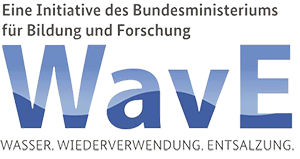Targeted removal of monovalent ions from saline groundwaters
Since 2021, nine innovatION collaborative partners from industry, research and practice have been researching selective desalination using membrane-assisted capacitive deionization (MCDI). For this purpose, selective ion exchange membranes for specific retention of monovalent salts are being developed by the Research Group Polymeric Membrane Materials of the Leibniz-Institut für Polymerforschung Dresden e.V. and FUMATECH BWT GmbH. The membranes are characterized and tested in the manufacturers' own test rigs and in two laboratory test plants built up by DEUKUM GmbH and elkoplan staiger GmbH.
The aim of innovatION is to selectively remove monovalent ions to make saline groundwater usable as drinking water or for artificial groundwater recharge. Different concentrations and operating settings for selective desalination are currently tested at the Chair of Process Engineering in Hydrosystems at the Technische Universität Dresden. In addition, a fluid model of a MCDI cell was created, which, under consideration of the spacers, calculates pressure losses for different load cases. The results were presented on a poster in March 2021 at the annual meeting of the ProcessNet-expert-groups Computational Fluid Dynamics + Mixing Processes + Agglomeration and Bulk Solids Technology.
The infiltration of the selectively desalinated waters is investigated by means of soil column experiments and modeling by the Group Hydrogeology and Landscape Hydrology of the Carl von Ossietzky University of Oldenburg. Here, the chemical and physical processes during infiltration of partially desalinated waters were analyzed in comparison to fully desalinated water for different soil types. The results on the geochemical interactions during infiltration of a monovalent-partially desalinated water into dune sediments of the East Frisian island Langeoog were presented in two posters and flash talks at the conference of the Fachsektion Hydrogeologie e. V. der DGGV (Deutsche Geologische Gesellschaft - Geologische Vereinigung).
For the economic and ecological sustainability assessment, the Chair of Business Administration, esp. Sustainability Management and Environmental Accounting of the Technische Universität Dresden already conducted a survey among the project partners to derive a recommendation for future action.
Within the framework of innovatION, an online workshop on the "Requirements for selective desalination in practice" was held on 07.03.2022 to ensure an exchange on the demand and implementation of selective desalination with external interested parties from water supply, research, industry, and politics. After the impulse presentations from the national and international (associated) practice partners, the participants were able to exchange information on the application, processes, and sustainability in the discussion forums.
In the future, further ion exchange membranes are to be manufactured and investigated, and a pilot plant with a flow rate of 100 L/h is to be set up. The pilot plant will then be tested at the Oldenburgisch-Ostfriesischer Wasserverband on Langeoog for the retention of sodium and chloride and at the Kreisverband für Wasserwirtschaft Nienburg for the retention of nitrate.
You can find the full newsletter from WavE here:
bmbf-wave.de/Publiktion/Newsletter.html



